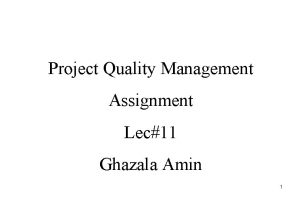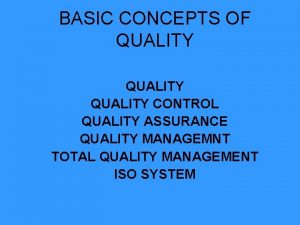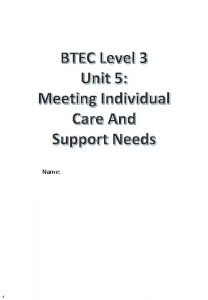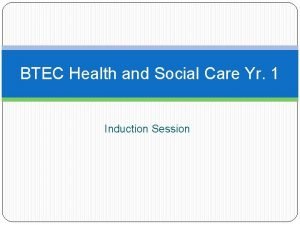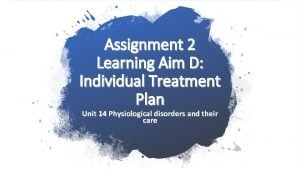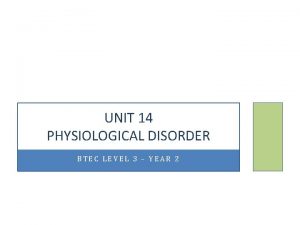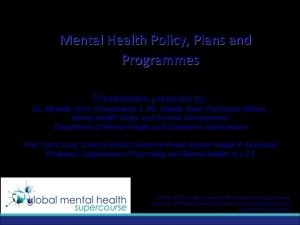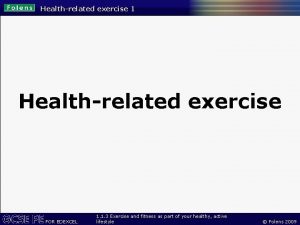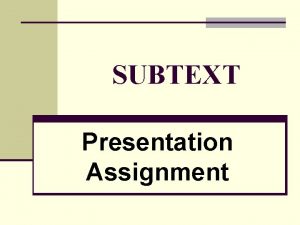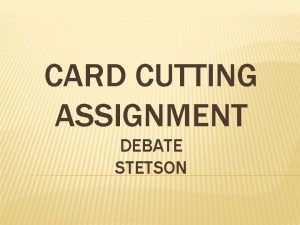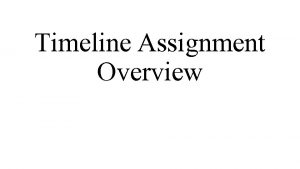Health Policy and Management Assignment 1 HealthRelated Quality













- Slides: 13

Health Policy and Management Assignment 1 Health-Related Quality of Life (HRQOL) Surveillance Summary Policy Brief

Presentation Overview • Health-Related Quality of Life (HRQOL): concepts and measurement • CDC HRQOL Surveillance Program’s Healthy Days Measures • Unhealthy days according to demographics: educational attainment and insurance status • Assignment overview: Policy brief on addressing disparities in HRQOL at the national level

Measuring Health-Related Quality of Life (HRQOL) • Broad outcome measures designed to measure physical, emotional, and social dimensions of health (Mc. Dowell & Newell, 1996). • No one definition of HRQOL is agreed upon, but generally assessed with generic measures (e. g. , Short-Form 36) or disease-specific measures (e. g. , Quality of Life in Epilepsy Scale-10 (Ware & Sherbourne, 1992; Cramer et al. , 1996). • Quality of Life Instruments Database (QOLID): Online database of generic and disease-specific measures. http: //www. proqolid. org

What is Health-Related Quality of Life (HRQOL)? • For public health surveillance purposes, HRQOL was defined as…“an individual’s or group’s perceived physical and mental health over time. ” (Measuring Healthy Days, CDC 2000) • http: //www. cdc. gov/hrqol • http: //www. cdc. gov/brfss


Core Healthy Days Measures 1. Would you say that in general your health is excellent, very good, fair, or poor? 2. Now thinking about your physical health, which includes physical illness and injury, for how many days during the past 30 days was your physical health not good? 3. Now thinking about your mental health, which includes stress, depression, and problems with emotions, for how many days during the past 30 days was your mental health not good? 4. During the past 30 days, for about how many days did poor physical or mental health keep you from doing your usual activities, such as self-care, work, or recreation?

Unhealthy Days = days in the past 30 days when both physical and mental health were not good = Physically unhealthy day = Mentally unhealthy day = Healthy day

Mean number of unhealthy days among adults by educational attainment ―U. S. , BRFSS, 1993– 2001

Mean number of unhealthy days among adults by insurance status ―U. S. , BRFSS, 1993– 2001

Assignment Instructions: 1. Retrieve the HRQOL Surveillance Summary document on CDC’s website (available at http: //www. cdc. gov/mmwr/preview/mmwrhtml/ss 5404 a 1. ht m). 2. Review the document and the HRQOL data presented, and identify a disparity in HRQOL in a population of interest (e. g. , according to the Healthy Days measures, women appear to be unhealthier than men). 3. Search and review additional articles on the chosen topic/disparity (see http: //www. cdc. gov/hrqol/publications_topic. htm as one possible resource).

Instructions continued: 4. Based on the review of these information sources, write a policy briefing (4 -5 pages) recommending and making the case for a specific intervention or action to address the disparity. Intermediate-level students should also: 5. Give consideration to necessary partnerships, appropriate evaluation methods, and propose a budget.


 Meaning of total quality management
Meaning of total quality management Athar mahmood
Athar mahmood Contemporary issues in supply chain management ppt
Contemporary issues in supply chain management ppt Quality assurance vs quality control
Quality assurance vs quality control Concepts of quality control
Concepts of quality control Health and social care unit 5
Health and social care unit 5 Unit 5 health and social care assignment
Unit 5 health and social care assignment Unit 14 learning aim d
Unit 14 learning aim d Unit 14 health and social care assignment
Unit 14 health and social care assignment Mpxr report
Mpxr report Leadership and commitment in tqm
Leadership and commitment in tqm Needs and expectations of interested parties example xls
Needs and expectations of interested parties example xls National policy and legislation related to child health
National policy and legislation related to child health Mental health policy, plans and programmes michelle funk
Mental health policy, plans and programmes michelle funk

